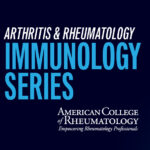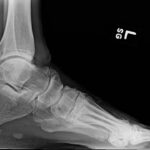In this episode, Dr. Kumar talks about the insidious nature of ageism and how rheumatologists can combat it.


In this episode, Dr. Kumar talks about the insidious nature of ageism and how rheumatologists can combat it.

Pediatric rheumatologic diseases are characterized by high rates of anxiety & depression known to impact health-related outcomes. CARRA and the ACR developed guidance statements to assess & manage mental health concerns for youths in pediatric rheumatology practice.

Learn how to identify & combat age-based discrimination for improved communication & better patient outcomes.

Carol A. Langford, MD, MHS |
The ARP & the Rheumatology Research Foundation are key partners in advancing rheumatology. Learn how they support care, training & research on their anniversaries.

Dr. Samantha Shapiro recounts her enthusiastic and ambitious early career in rheumatology—a path that culminated in burnout and a brave choice with new opportunities.

Bryn Nelson, PhD |
Despite anecdotal reports to the contrary, a large observational study concludes that TNF inhibitors, compared with non-TNF biological or targeted synthetic DMARDs, do not cause higher rates of death or respiratory hospitalization in patients with RA-ILD.

Dr. Anna Zezon discusses the challenges, opportunities & joys of running a private rheumatology practice as a solo practitioner.

Dr. Jay Reidler, an adult & pediatric orthopedic spine surgeon, shares insights from his field & discusses his collaborations with rheumatologists.

Katie Robinson |
A recent Arthritis & Rheumatology review article explores the immune system’s mechanism for creating B cells that respond to diverse pathogens while preserving immune tolerance & highlights key insights for rheumatologists.

The Association for Rheumatology Professionals (ARP) celebrates 60 years & the Rheumatology Research Foundation marks 40 years of advancing patient care & research.

Deborah Levenson |
New global criteria for pediatric CNO aim to boost research & improve care for this rare autoinflammatory bone disease.

Sendaydiego et al. asked: Do some DMARDs pose a greater cancer risk than others for patients with RA? Here are insights from the study and its clinical implications.

Bryn Nelson, PhD |
A recent Proceedings of the National Academy of Sciences study found that high-intensity aerobic exercise may reduce the release of cell-free DNA & tamp down inflammation over time.

Yvonne M. Golightly, PT, MS, PhD, Jill Halstead, BSc, MSc, PhD, MRCPod, John B. Arnold, PhD, Lara S. Chapman, MSc, BPod, Catherine J. Bowen, PhD, BPod, Marian T. Hannan, DSc, MPH, Hylton B. Menz, PhD, BPod, Kade L. Paterson, PhD, BPod, BAppSci(Hons) & Martin J. Thomas, PhD, MCSP |
Midfoot OA experts offer an overview of a common, but under-recognized, form of OA, & discuss quality of life impacts, treatments, clinical evaluation procedures & the critical need for further research.

Deborah Levenson |
Long-term remission & control of CVD risk factors can reduce the risk of atherosclerosis in lupus; triple APL positivity raises the risk of CVD, study finds.

In comments to the CMS, the ACR advocated for telehealth flexibilities and fair reimbursement and pushed back on proposed efficiency adjustments and changes likely to increase administrative burden on practices.

The roundtable included discussions on emerging issues in state advocacy, prior authorization reform, likely impacts of the Big Beautiful Bill and physician wellness.

Using data from registries across Europe and Canada, Aymon et al. compared the incidence of major adverse cardiac events (MACE) in patients with RA treated with JAK inhibitors, TNF inhibitors or biologic DMARDs with other modes of action over two years. The researchers did not find an increased risk of MACE with JAK inhibitors over that time frame.

In today’s rapidly evolving healthcare landscape, rheumatologists face a growing number of challenges. Advocacy is a critical tool that helps protect and advance the profession and the patients it serves.

A phase 2 study from Spiera et al. found that patients with glucocorticoid-dependent PMR taking the antibody-drug conjugate ABBV-154 had a longer time to flare compared with those taking placebo, supporting further investigation.

Dr. Marc Hirsch reflects on a career dedicated to advocating for physicians, providing patient-centered care & advancing medical education.

The FDA has approved a new drug application for TNX-102 SL (Tonmya), a tablet with 2.8 mg of cyclobenzaprine HCl, after two clinical trials demonstrated the safety and effectiveness of the treatment in adults with fibromyalgia.